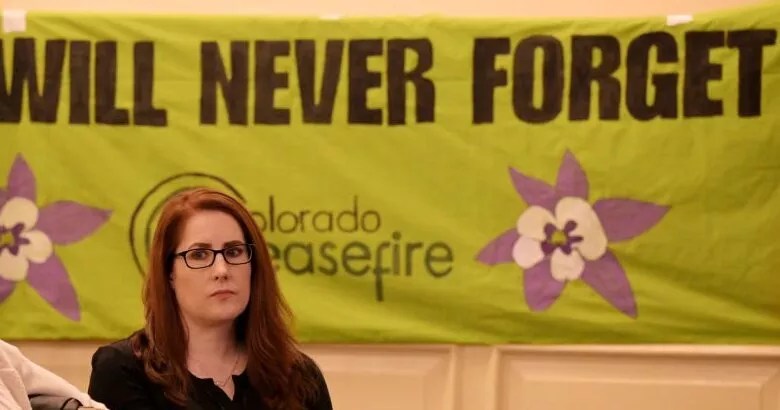
Getty Images

Audio By Carbonatix
After the Columbine tragedy, thousands of people said these words: “Never Forgotten.” A fund was established called the Never Forgotten Fund, and many people donated to it.
The sadness was everywhere, and we thought we would never stop caring, never stop feeling, never want to forget. Columbine was our heart, and our hearts were broken. Many of us could not even say the word “Columbine” without being sad and without trying to help.
In February, Anne Marie Hochhalter – one of the students who was shot at Columbine High School on April 20, 1999 -died at home, alone. A welfare check had been called in, and she was discovered to have died from sepsis, a medical problem that, while serious, can be treated. I know: I have had sepsis twice in the last six years, and my condition involved visiting a transfusion center and careful monitoring and care. Sepsis is serious. It requires attention and professional care.
Anne Marie died alone at home. The police had to make a welfare check at her residence, where she was found.
I don’t know who is at fault, or even if anyone is at fault.
I do know that without the help of my wife and a few good friends, I might have had the same result.
Today, I am thinking of the walking wounded. The survivors of Columbine. The last time I talked to him, Richie was living in a cheap hotel in California. He has very little money, is too proud and won’t ask for help, despite his continuing paralysis. Lance is trying, hurting, still with the same problems. Mark was shot and has been in and out of facilities for years. Kacey is married, but still deals with the consequences of attending that school on that day. They all show incredible resilience and courage.
There are more. Austin died from a drug overdose, from drug use after being shot at Columbine.
Although Anne Marie was paralyzed from the waist down, she was independent, driving herself with a special vehicle. I hadn’t seen her in a long time, but I am pretty sure she got rid of the pickup truck for a more functional vehicle.
There are so many wounded, and so many lost, and I haven’t even mentioned the ruined lives of many others. So many kids who attended that school deal with the memory, the emotions, the sadness that just won’t go away.
Yes, people have tried to help.
The Never Forgotten Fund, filled by donations from private donors and companies, gives college scholarships every year to children graduating from high school. It is a very nice thing. They care. They are doing something.
The Columbine Memorial is open at Clement Park, funded by so many people with caring hearts, to honor the murdered children. It is a nice memorial, a nice place to visit. And there are other memorials all over.
But are they doing the right thing?
There are so many children from Columbine, now around forty years of age, who are still hurting, still dealing with the tragedy.
There is no help for them.
We all go on with our lives. It has been so many years, and the victims don’t want to be thought of as victims. They want to move on, too, and be independent.
Anne Marie was independent, and she died at home without medical attention, from an infection that has to be treated very quickly.
Does this tell us something about ourselves? Seriously: Does this tell us that we really care, but only for a certain amount of time?
We donate to the Never Forgotten Fund, and then slowly, as time goes on, we move on to other things, to our own lives. We donate to the Columbine Memorial, visit a few times, and then move on to our own lives. This makes sense. Our own lives have problems and sadness, too. All of us live with sadness.
Perhaps when there is a tragedy, we shouldn’t build a memorial to honor those who are gone: We should take that money and use it to help the living.
Perhaps when there is a tragedy, we shouldn’t put money into a fund for scholarships: We should put that money into a fund to help the survivors with their lifetime of sadness and recovery.
Perhaps that would have helped some of the many emotionally damaged children and some of the physically harmed children – by providing ongoing care, attention and treatment. A fund that would give needed assistance for the injured and damaged children, that would acknowledge the struggles that these children, now grown, still face.
As we can see from the continuing loss of these victims, the Never Forgotten Fund and the Columbine Memorial do not accomplish this. They both honor the past, and ignore the continuing needs of those who survived. Those who survived are the forgotten victims of Columbine.
The forgotten victims of Columbine, like Anne Marie.
Randy Brown is a Columbine parent whose son, Brooks, was in school with Eric Harris and Dylan Klebold, the killers. He’s the author of The Inside Story of Columbine: Lies, Coverups, Ballistics, Lessons, and continues to follow the aftermath of the tragedy.
On weekends, westword.com publishes commentaries on matters of interest to the community; the opinions expressed in these pieces are those of the authors, not Westword. Have one you’d like to submit? Send it to editorial@westword.com, where you can also comment on this article.